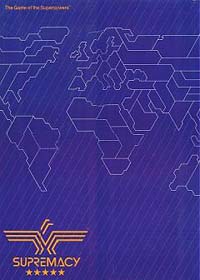A couple of weeks ago I finally won this board game blast from the past on eBay. I used to have this game 20 years ago with the better two expansion packs; the alternate resources deck (to throw off the players who always preemptively invade Arabia) and a book containing pre-made treaties and rule clarifications. Even without those additions, Supremacy is a really fun, yet difficult game, especially for people accustomed to using Risk’s strategy.
Looking it at now, it feels very dated too. How? One of the superpowers is the Soviet Union (out of business as of 1991), laser satellites (aka Star Wars or SDI) and each player has seven billion dollars starting money; even in the Eighties, the US military budget was at least 50 times that amount. On the other hand, it is still innovative by incorporating the use of resources (oil, grain and minerals) and a shifting world market (the going prices for the resources mentioned earlier). After playing it a couple times (I usually ran the theoretical African Federation), I quickly learned that it was sometimes smarter to keep making money, horde resources and let the people still using the naive Risk tactics knock each other out first. However, once the atom bombs start flying, that’s when everyone’s civility is depleted. I had been nuked off the map a couple times for profiteering too.
Sadly, the publisher of Supremacy went out of business. Not sure why. While searching on the Internet for the alternate resource deck, I found a reseller of out-of-print games who solicited the game’s third edition of it; I only recall there being a second before it disappeared. Personally, my theory on the game’s demise wasn’t the shift in the geopolitical reality but the production of too many accessories. The alternate deck shifting the location of the resources was great for those who played Supremacy often. The introduction of boomers (submarines), tanks, high-tech improvements, neutron bombs, two more superpowers (Australasia and Canartica) and the mega-map (dividing the world into smaller sections) became too much hair splitting. Hair splitting becomes cumbersome. Cumbersome usually makes a game slower, clunky and overwhelming (sort of what’s happening to D&D 3.5). Eventually, most people just quit playing since they don’t want to spend the time and money keeping up. Much like Risk or even Axis & Allies, the militaries’ capabilities being abstract worked best.
From Austin to Adelaide
8915 Miles!Seattle
weeks-3-9days0-4hours-1-9minutes-4-5seconds-4-8Categories
Friends of Picayune
Meta


Having last played this game way back during the first Bush administration, I had to start back at the low end of the learning curve all over again when Steve, Somara, another friend, and I played last week. The game mechanics were elegant and the overall experience was quite fun. The game ended with the world going kaput after a furious exchange of nukes.
My only question for more experienced Supremacy players is: how the heck does some one actually win when its so easy for the world to get destroyed (more than 12 nukes delivered on-target during the course of the game = game over / world over)? Seems to me that the desire for nuclear vengeance will kick in long before a military or economic stranglehold will knock out an opponent.
Of course, this is all based on a single measly game. I’m sure I am missing some deeper strategy than “an eye for an eye” which is pretty much what we all were using that night. Anyway, the game was so much fun, I have put my own bid in on a copy from Ebay.